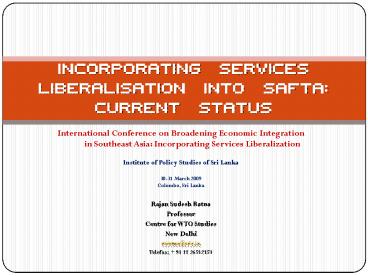International Conference on Broadening Economic Integration - PowerPoint PPT Presentation
1 / 13
Title:
International Conference on Broadening Economic Integration
Description:
Importance of Services especially Tourism was recognised in the Tenth SAARC ... recommendations of the Third Meeting of the SAFTA Committee of Experts thereon. ... – PowerPoint PPT presentation
Number of Views:76
Avg rating:3.0/5.0
Title: International Conference on Broadening Economic Integration
1
INCORPORATING SERVICES LIBERALISATION INTO SAFTA
CURRENT STATUS
- International Conference on Broadening Economic
Integration - in Southeast Asia Incorporating
Services Liberalization - Institute of Policy Studies of Sri Lanka
- 30-31 March 2009
- Colombo, Sri Lanka
- Rajan Sudesh Ratna
- Professor
- Centre for WTO Studies
- New Delhi
- rsratna_at_nic.in
- Telefax 91 11 26512151
2
Services in SAFTA chronology
- Importance of Services especially Tourism was
recognised in the Tenth SAARC Summit(Colombo,
29-31 July 1998). - Thirteenth SAARC Summit (Dhaka, 12-13 November
2005) recognised the potential of trade in
Services, especially informal trade and decided
for a study to see how services could be
integrated into the SAFTA process. - First Meeting of the SAFTA Ministerial Council
(Dhaka, 20 April 2006) approved the course of
action including completion of study on Services
in a time bound manner. - Second Meeting of the SAFTA Ministerial Council
(Kathmandu, 26 February 2007) approved the
recommendations made by the SAFTA Committee of
Experts and directed the Secretariat to ensure
that the Study on Trade in Services should be WTO
plus, as also WTO compliant.
3
Services in SAFTA chronology (2)
- The Fourteenth SAARC Summit (New Delhi, 3-4 April
2007) agreed to the vision of a South Asian
community, where there was smooth flow of goods,
services, peoples, technologies, knowledge,
capital, culture and ideas in the region. They
stressed that to realize its full potential,
SAFTA should integrate trade in services. They
called for a finalisation of an Agreement in the
services sector at the earliest.
4
Services in SAFTA chronology (3)
- Third Meeting of the SAFTA Committee of Experts
(New Delhi, 1-2 March 2008) took note of the
Revised Regional Study done by the Coordinator of
the Study Research and Information System for
Developing Countries (RIS), New Delhi . It
recommended that RIS may be requested to draft a
Draft SAARC Framework Agreement on Trade in
Services (SAFAS) by 30 June 2008. - Third Meeting of the SAFTA Ministerial Council
(New Delhi, 3 March 2008) considered the Study on
Potential of Trade in Services under SAFTA
including recommendations of the Third Meeting of
the SAFTA Committee of Experts thereon. The
Meeting endorsed the recommendations of the Third
Meeting of SAFTA COE and decided that RIS be
requested to draft the text of Draft SAARC
Framework Agreement on Trade in Services (SAFAS)
by 30 June 2008. It also decided to constitute an
Expert Group by 30 June 2008 to commence
negotiation on the Framework Agreement on Trade
in Services.
5
Services in SAFTA chronology (4)
- The Fifteenth SAARC Summit (Colombo, 2-3 August
2008) expressed satisfaction at the conclusion of
the Study on Trade in Services and welcomed the
decision of SAFTA Ministerial Council to commence
negotiation on the Framework Agreement on Trade
in Services. Towards achieving further economic
integration, they also directed that the Draft
Agreement on Investment Promotion and Protection
be finalized early and the SAARC Arbitration
Council be operationalized.
6
Highlights of study by RIS
- The study summarized the importance of service
sector in the SAARC economies and trade including
intra-regional trade while examining the
potential of trade in services in the region in
view of their complementarities as well as the
potential of mutual trade in select services
sectors. - It examined the patterns of liberalization of
trade in services by SAARC countries under GATS
commitments and done autonomously and highlights
the regulations that may act as barriers.
7
Highlights of study by RIS (2)
- It discusses the relevance of liberalization of
trade in services in terms of benefits and costs
of such liberalization. - Lists some sectors of high priority as identified
by the national studies Tourism, Transport, IT,
ITeS Telecom, Energy, Education, Health,
Financial Services, etc. - Finally it proposes for following a positive list
approach to enable progressive, sequential
liberalisation, including some special and
differential treatment for LDCs as recognized in
SAFTA.
8
CURRENT STATUS
9
Services Negotiations
- 1st meeting of Expert Group November 2008,
Kathmandu - 2nd Expert Group Meeting January 2009,
Kathmandu - 3rd Expert Group Meeting May 2009, Kathmandu
(tentative)
10
Services Broad principles
- The Expert Group has reached an understanding on
- Guidelines and timeframes for negotiations
- WTO Sectoral classification could be the base
- Progressive liberalisation of Services as per
Article V of GATS - Positive list approach to be followed with a
request and offer modality
11
Future Roadmap
- Given the fact that only two meetings have been
held so far, the progress made is encouraging. - Framework Agreement may not pose much problems.
- More meetings will bring complex issues which
would need to be resolved. - Areas of difficulty Commitments going beyond
GATS as well as either committing at least
(freezing) or going beyond autonomous
liberalisation, Sectors Modes to be included,
definitions of juridical persons or legal
entities, etc.
12
Services Way Forward
- SAARC Members have been through lots of
impediments/problems in matter of trade. - Members are at various stages of economic
development and thus ambition levels needs to be
realistic. - If individual country interest is kept primary
the overall objective of regional prosperity
development will suffer. - Need for prioritising the regional benefits and
negotiate accordingly while keeping the
individual priorities/market access priorities
for the later part of negotiations or during
subsequent periodical reviews.
13
THANK YOU

